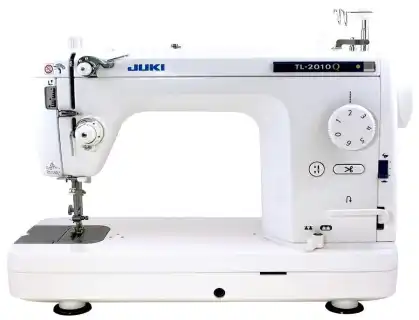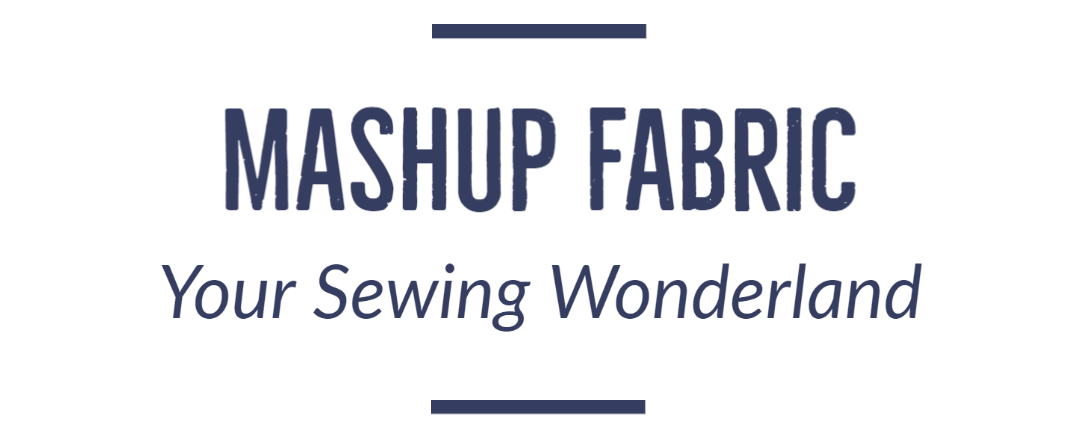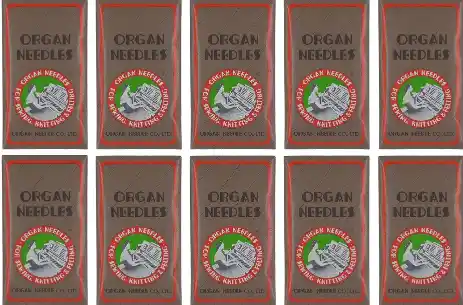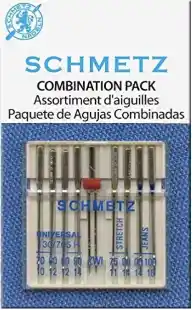Finding the best needles for your Juki 2010Q is critical to getting optimal performance from your sewing machine. Using the wrong needle can lead to a variety of issues like skipped stitches, broken needles, and fabric damage.

The Juki 2010Q is a popular quilting and sewing machine, so choosing a needle that can handle multiple layers and heavy materials is important. Many sewers recommend Organ HL X 5 needles specifically designed for sewing through thick and quilted fabrics.
Schmetz also makes needles compatible with Juki machines that are known for quality and durability.
Paying attention to needle size and type will allow your Juki 2010Q to sew beautifully through any project.
Needle Options for the Juki 2010Q
There are a few brands that make needles specifically designed to work optimally with the Juki 2010Q. Choosing the right needle for your fabric type, thread weight, and sewing application will allow your Juki 2010Q to run smoothly.
Organ Needles
Organ needles are a top choice for the Juki 2010Q. Here are two types to consider:
- HL X 5 needles – The HL X 5 is an industrial-style needle with a flat shank made for sewing through multiple layers and heavy materials. It is ideal for:
- QuiltingJeans and other dense fabricsAppliqueEmbroidery
- Titanium needles – Organ’s titanium needles are extremely durable and resistant to wear. The titanium coating lasts 3-5x longer than standard chrome needles. Great for handling heavy duty projects.
Schmetz Needles
Schmetz is another reputable brand that makes high-quality needles compatible with Juki machines including the 2010Q.
Some top Schmetz needle options include:
| Needle Type | Benefits |
|---|---|
| Universal | All-purpose for most fabric types |
| Quilting | Designed for quilting through multiple fabric layers |
| Embroidery | Sharp point for precision embroidery |
| Microtex | Sharp point for woven fabrics |
| Jersey/Ballpoint | Round point won’t damage knits/stretchy material |
Schmetz needles come in a wide range of sizes to match your thread and fabric weight. Many sewers praise the quality and durability of Schmetz needles.
C. Other Considerations
When selecting needles, keep these tips in mind:
- Match needle size to fabric thickness. Heavier fabrics require a higher size like 90/14 or 100/16. Consult your manual.
- Consider the needle point shape. Sharp, ballpoint, or universal.
- Change your needle frequently. A worn needle can cause problems.
- Stick to quality brands designed for your machine. Avoid cheap generic needles.
Using the correctly sized and shaped needle will allow your Juki 2010Q to produce the best possible embroidery and quilting results on any project!
Tips for Choosing the Right Needle
Picking the perfect needle for your Juki 2010Q machine is not hard if you follow some basic guidelines. Here are helpful tips on selecting the best needle to suit your project and fabric type:
- Consult your manual – The Juki 2010Q manual will provide recommendations on needle sizes and types. This is the best place to start.
- Consider fabric thickness – Needle size should match fabric thickness and weight:
| Fabric Type | Recommended Needle Size |
|---|---|
| Lightweight fabrics | 60/8 or 65/9 |
| Medium weight fabrics | 70/10 or 75/11 |
| Heavy fabrics like denim | 80/12 to 100/16 |
- Match the needle type to fabric:
| Fabric | Needle Type |
|---|---|
| Woven fabrics | Universal or Microtex (sharp) |
| Knits and stretch | Jersey/ballpoint |
| Leather, vinyl | Leather needles |
| Denim, canvas | Jeans/denim needles |
| Multiple layers like quilting | Quilting needles |
- Fabric Needle Type Woven fabrics Universal or Microtex (sharp) Knits and stretch Jersey/ballpoint Leather, vinyl Leather needles Denim, canvas Jeans/denim needles Multiple layers like quilting Quilting needles
- Replace needle regularly – A new needle makes a difference in stitch quality. Change every project or sooner if experiencing issues.
- Choose quality brands – Opt for needles made for domestic machines like Organ, Schmetz, or Juki.
| rand | Notes |
|---|---|
| Organ | Good quality, available sizes and types |
| Schmetz | Extremely sharp point, durable |
| Juki | Designed specifically for Juki machines |
Using the proper needle leads to:
- Smooth, even stitches
- Minimal skipped stitches
- Less needle bending or breakage
- No damage to fabrics
- Optimal performance from your Juki machine
Take a few minutes to change out your needle and you’ll notice a real difference in your sewing and quilting results!
Benefits of Using the Right Needle
Choosing the best needles for your Juki 2010Q provides many advantages that can take your sewing to the next level. Here are some of the key benefits:
- Prevent skipped stitches and thread breaks
- Skipping is often caused by a damaged or wrong sized needle. The right needle glides smoothly through fabric preventing skips.
- Avoid needle bending and breakage
- Heavy duty needles like Organ’s HLx5 are designed to handle tough, dense fabrics without bending or snapping.
- Get optimal stitch quality
- A sharp, high-quality needle produces even, consistent stitching on both woven and knit fabrics.
- No fabric damage
- Ballpoint needles gently push fabric fibers aside rather than piercing them, preventing holes in knits.
- Machine runs quieter
- A properly sized needle reduces noise and vibration for smoother running.
- Increase machine lifespan
- Bent and broken needles overwork the machine motor and timing. The right needles protect your investment.
- Sew faster and more efficiently
- Fewer needle issues means less troubleshooting and more productive sewing time.
- Handle a wider range of fabrics
- With the right needles, sew anything from silks to denim and quilted layers easily.
- Get the results you want
- The proper needle helps the machine produce beautiful embroidery, perfect seams, and neat edges.
- Avoid frustration and wasted projects
- No more stitching entire projects only to find skipped stitches or fabric damage from the wrong needle!
Taking a bit of time to choose and change your Juki needles pays off with better results and enjoyment of your machine. Investing in quality Schmetz or Organ needles gives your 2010Q the best chance of sewing like a dream.
Conclusion
Finding the best needles for your Juki 2010Q has many advantages for your sewing and quilting projects. By taking the time to choose the right needle type and size, you allow your machine to work optimally. Your projects will turn out better with no skipped stitches, needle breaks, or fabric damage.
The key things to remember when selecting needles for your Juki are:
- Consult your manual for recommendations
- Match needle size to fabric thickness
- Choose needles designed for domestic machines like Schmetz and Organ
- Consider the needle tip shape for your fabric type
- Change needles frequently for best results
Investing in high quality needles keeps your Juki 2010Q running smoothly and allows it to handle heavy duty materials like denim and quilting layers with ease. Well-made Schmetz and Organ needles are engineered to withstand high speeds and tough fabrics without bending or breaking.
Take the time to select the right needle for your project, and you’ll see a noticeable difference in your Juki’s performance. Your machine and fabrics will thank you!


